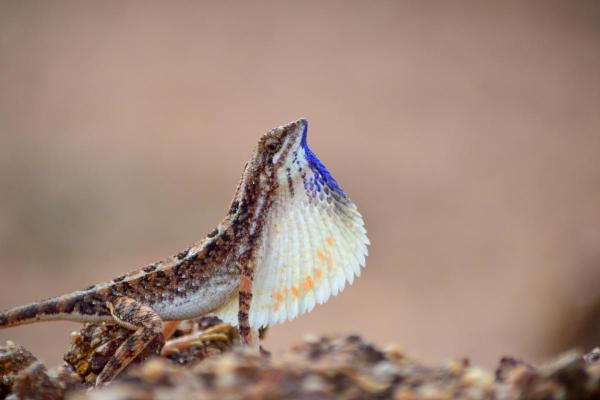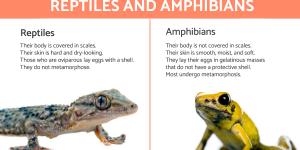Is a Crocodile a Lizard? - Lizard vs. Crocodile


There are many reasons one might think to ask is a crocodile a lizard? They have a scaly body with four legs, a long tail and a prehistoric face. They are both reptiles and have various similarities physically, taxonomically and otherwise. They both look like contemporary dinosaurs, creatures whose name translates to ‘terrible lizards’. Crocodiles are indeed terrible lizards. Not terrifying lizards, but terrible at being lizards. This is because crocodiles are not lizards at all.
At AnimalWised, we compres these two reptiles by looking at the similarities and differences of a lizard vs. crocodile. In doing so, we understand that anatomical and behavioral similarities do not exclude animals from being taxonomically different.
Why is a crocodile not a lizard?
A lizard and crocodile are not the same type of animal. Although they are both reptiles, they belong to different animal groups according to both scientific classification and common groupings. Despite this fact, many people still consider crocodiles to be a type of lizard. Such misconceptions are one of the main reasons we have taxonomic and scientific classifications. They help to avoid confusing and better structure our knowledge of the natural world.
Unfortunately, such effort to create order among chaos is not always easy to achieve. This is partly because the common names we use for plants and animals do not correspond. These names can differ according to location, culture and many other factors. Since lizards are reptiles with a long body, four short legs and thick skin[1], it can seem like crocodiles are indeed lizards.
In actuality, the true definition of a lizard is a reptile which belongs to the order Squamata. The animals within this order are known as squamates or scaled lizards, but they do not include crocodiles. Crocodiles belong t the order Crocodilia, an order of reptiles that also includes alligators, gharials and caimans. To better understand the differences between these two reptilian orders, we look at the following lizard vs. crocodile similarities and differences.

Differences between lizards and crocodiles
We know that all lizards and crocodiles are reptiles. But if we look at the example of monitor lizards and crocodiles, we can see there are many differences. Some of the most important differences are the following:
- Classification: as stated above, lizards belong to the order Squamata, while crocodiles belong to the order Crocodilia. Other reptiles belong to this latter order, with true crocodiles placed in the family Crocodylidae.
- Evolution: lizards have an evolutionary line shared with snakes (Serpentes) and worm lizards (Amphisbaenidae). The latter are elongated reptiles which usually do not have limbs. The evolutionary progression of crocodiles relates them more closely to birds, dinosaurs and pterosaurs.
- Size: lizards develop in a range of dimensions from very small to large, but crocodiles are all large. The smallest member of the group known as lizards measures a few centimeters. This is a recently identified type of chameleon. Within the family of true crocodiles, the smallest species is the dwarf crocodile (Osteolaemus tetraspis) measures around 1.5 m/5'. The largest lizard is the Komodo dragon (Varanus komodoensis), a type of monitor lizard which measures an average of 3 m/10? in length. The largest crocodile is the saltwater crocodile (Crocodylus porosus) which has males measuring about 6 m/20' long.
- Physical features: there is a much larger variety of physical features in lizards. They can be of a very wide range of colors, some have prehensile tails and some have physical traits that resemble spines or horns. Crocodiles are more uniform in terms of morphology. Another difference is that, like mammals, crocodiles can still breathe with their mouths full of water or food. Lizards cannot do this. Read our related article to see how different reptiles breathe.
- Tongue: lizards can stick out their tongue, which in many species is quite long. Crocodiles can't stick it out because it's attached to a membrane.
- Diversity: the lizard group is much more diverse than the crocodile group. In the former there are some 2,939 species, while in the latter there are only 17.
- Internal phylogeny: squamates are internally closer in kinship to tuataras, endemic to New Zealand. Crocodiles are more closely related to birds.
- Habitat: lizards are more diverse in terms of habitat. Depending on the species, they can live in arid, wooded areas. Some are exclusively terrestrial, others have arboreal habits or even semi-aquatic marine habitats. Crocodiles are more limited in this sense as they all lead a semi-aquatic life.
- Diet: depending on the species, lizards can be carnivorous, omnivorous or herbivorous. Crocodiles are all carnivorous since they are large predators.
- Poison: within lizards there are various species that are venomous, while no crocodiles have venom. Learn more about the most venomous lizards with our related guide.
- Reproduction: although most lizards are oviparous, there are also some that are viviparous. All crocodiles are oviparous.
- Swimming: crocodiles are excellent swimmers, whereas lizards are not. There are only a few exceptions such as the marine iguana (Amblyrhynchus cristatus). Learn more with our article on the different types of aquatic reptiles.

Similarities between lizards and crocodiles
We have seen that lizards and crocodiles have many differences, but there is a reason many people confuse crocodiles for lizards and vice versa. This is because there are many similarities between the two types of reptile. Here are some of the most important:
- Both lizards and crocodiles belong to the class Reptilia.
- Crocodiles have tough skin covered in protective scales, most lizards do too.
- Both groups carry out internal sexual reproduction. Learn more with our article on how crocodiles reproduce.
- Crocodiles do not have sex chromosomes, sex is determined by the incubation temperature of the eggs, the same thing happens in many lizards.
- The two groups are ectothermic type animals.
- Crocodiles have keen senses, as do most lizards.
- The two animals share many of the same internal organs, e.g. lungs, heart, liver, stomach, pancreas, kidney, bladder, reproductive organs and others.
- Both lizards and crocodiles are diapsid animals, i.e. their skulls have two openings at the temporal level.
- Both can move very well on land.
- Crocodiles have four-fingered limbs, so do most lizards.
- Several species of lizard and crocodile are at some level of risk in terms of conservation.
Now you know the difference between lizards and crocodiles, you can learn more about the microcosmic differences between crocodiles and alligators.
If you want to read similar articles to Is a Crocodile a Lizard? - Lizard vs. Crocodile, we recommend you visit our Facts about the animal kingdom category.
- Hickman, Jr., C. P, Roberts, L. S., Keen, S. L., Larson, A., L'Anson, H., & Eisenhour, D. J. (2000). Integrated Principles of Zoology 14th ed., McGraw-Hill Higher Education.
- ITIS. (2022). Squamata. Retrieved from: https://www.itis.gov/servlet/SingleRpt/SingleRpt?search_topic=TSN&search_value=173861#null
- ITIS. (2022). Crocodile. Retrieved from: https://www.itis.gov/servlet/SingleRpt/SingleRpt?search_topic=TSN&search_value=551734#null







